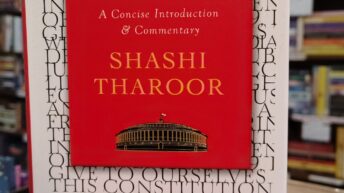
Utpal Kumar’s “Eminent Distorians” critically examines the works and ideologies of key Indian historians, offering a well-researched and nuanced analysis of how Indian historical narratives have been shaped by political, socioeconomic, and ideological influences, rather than simply presenting biographies. This book chronologically and thematically explores the evolution of Indian historiography from the early 19th century to today, featuring colonial academics, post-independence thinkers, and modern historians.
Utpal Kumar’s distinguishable methodology lays emphasis on understanding historians within their specific ideological & sociopolitical environments. His analysis explores how nationalist movements, Marxist ideology, colonial rule, and international intellectual currents influenced their perspectives on Indian history. This contextual framework enables readers to realise that historical writing is shaped by its era, frequently reflecting dominant ideologies.
The author provides a detailed analysis of historians, considering their prejudices and shortcomings as well as their positive impacts. With their Eurocentric perception, Western scholars such as Mill & Jones, through their academic work, aimed to legitimise colonial rule by depicting India as a land requiring external intervention.
Kumar examines R.C. Majumdar’s comprehensive contributions to Indian history, highlighting his nationalist viewpoint and occasionally questionable interpretations that championed an idealised image of Indian civilization. Although recognizing Majumdar’s scholarly approach, Kumar points out possible instances of partiality or a selective recounting of events.
Romila Thapar’s focus on early Indian history’s cultural and social processes and her fact-based methodology is highlighted. While acknowledging criticism of her tendency to neglect of political and economic factors, the author recognises her significant contribution to a better understanding of ancient India.
British colonial historians rationalised their rule by depicting Indian society as underdeveloped and requiring European guidance. Conversely, following independence, historians influenced by Marxist ideology presented differing perspectives, putting priority on social equity, economic progress, and class conflict, thereby disputing colonial accounts. Meticulous research employing critical analytical approaches facilitated the revision of previously ignored historical events. This shift, reflecting researchers’ various stances, created a rich academic tapestry, enhancing our understanding of India’s complex past.
Drawing on Marxist historiography, Kumar analyses how Romila Thapar, Irfan Habib, and D.D. Kosambi challenged colonial interpretations by focusing on social movements, economic patterns, and marginalised groups, using materialist approaches, dialectical methods, and quantitative analysis. He highlightd their methodological innovations, which fostered a more inclusive and evidence-based development of Indian historiography.
The author acknowledges the contribution of Marxist scholarship for understanding historical dynamics, particularly economic structures, and class struggles, but warns against merely focusing on class, as cultural and religious factors are also crucial. Advocating a comprehensive historical analysis incorporating cultural, religious, and postcolonial perspectives, Indian historiography has shifted from biased colonial records to diverse indigenous sources. Drawing on anthropology, sociology, and linguistics, this interdisciplinary method offers a richer, more genuine perspective on India’s history.
Kosambi revolutionised Indian historiography by blending Marxist theory with quantitative analysis, opposing conventional interpretations. Thapar subsequently improved standards by stressing textual and archaeological studies, enhancing evidential precision, and broadening the range of sources used. Continuous methodological progress and openness to new data and viewpoints are crucial for historical investigation.
Kumar’s book reviews the differing perspectives of colonial and nationalist historians in their interpretations of Indian history. Nationalist scholars tended to highlight India’s past glories, whereas colonial historians often focused on periods of decline. Kumar argues that both viewpoints, despite potentially good intentions, often resulted in oversimplified or mythologized accounts of intricate historical occurrences.
History’s susceptibility to politicisation is a significant theme. Kumar discusses how history is employed in ideological debates, the construction of identities, and the establishment of political authority. Disputes over the interpretation of caste histories, religious clashes, and regional identities serve as prime examples of this. Kumar urges contemporary academics to engage in these discussions with impartiality, intellectual discipline, and an awareness of their own biases.
Additionally, he draws attention to the emergence of gender, community, and post-colonial histories, which subvert conventional narratives focussed on political events and elites.
Historical studies are transforming by moving beyond traditional accounts focused on political elites. A more inclusive paradigm shift puts the accent on marginalised voices, diverse experiences, and new methodologies. This revolution challenges traditional narratives and provides a richer understanding of the past by acknowledging human diversity. This expansion not only broadens historical inquiry but also reevaluates established interpretations. The field is fundamentally altering how we understand and write about history.
Utpal Kumar’s book “Eminent Distorians” offers a commentary on history and a survey of the past, advocating for a strong, essential, and pluralistic approach. Since history is always politicised, Kumar emphasises that understanding diverse perspectives enriches our comprehension of India’s past and prevents it from becoming divisive.
Kumar’s book stresses academic integrity, mentorship, and the need to reevalutate history with new information. He encourages young academics to consider diverse perspectives, use interdisciplinary methods, and question established ideas.
Conclusion
Utpal Kumar’s “Eminent Distorians” provides a thorough exploration of Indian historiography by integrating methodology, critical perspectives, and biographical details to highlight the key figures and their underlying intentions in shaping the narrative of Indian history. The book’s evenhanded approach, perceptive analysis, and extensive background information establish it as a crucial resource for students, scholars, and general readers interested in India’s intellectual heritage.
His work evinces the evolving nature of history, influenced significantly by its chroniclers. It advocates for humility, intellectual curiosity, and thorough scholarship as essential elements for the progress of Indian historiography. Serving as a roadmap for future research and an homage to significant Indian history writers, “Eminent Historians” underscores the scholar’s role in fostering historical understanding.
This book fearlessly challenges prejudiced accounts, reveals hidden realities, and presents a novel, Indic perspective on India’s past. It encourages readers to question, reconsider, and engage with their heritage thoughtfully and knowledgeably.






Add comment